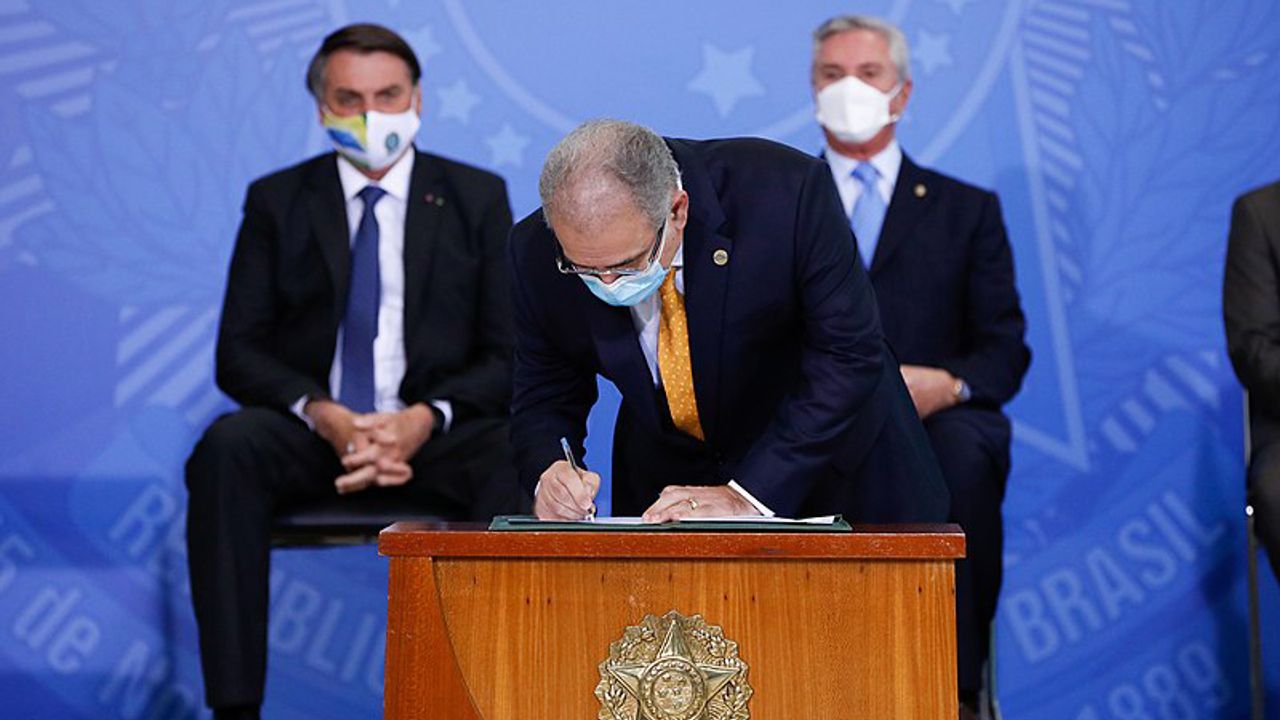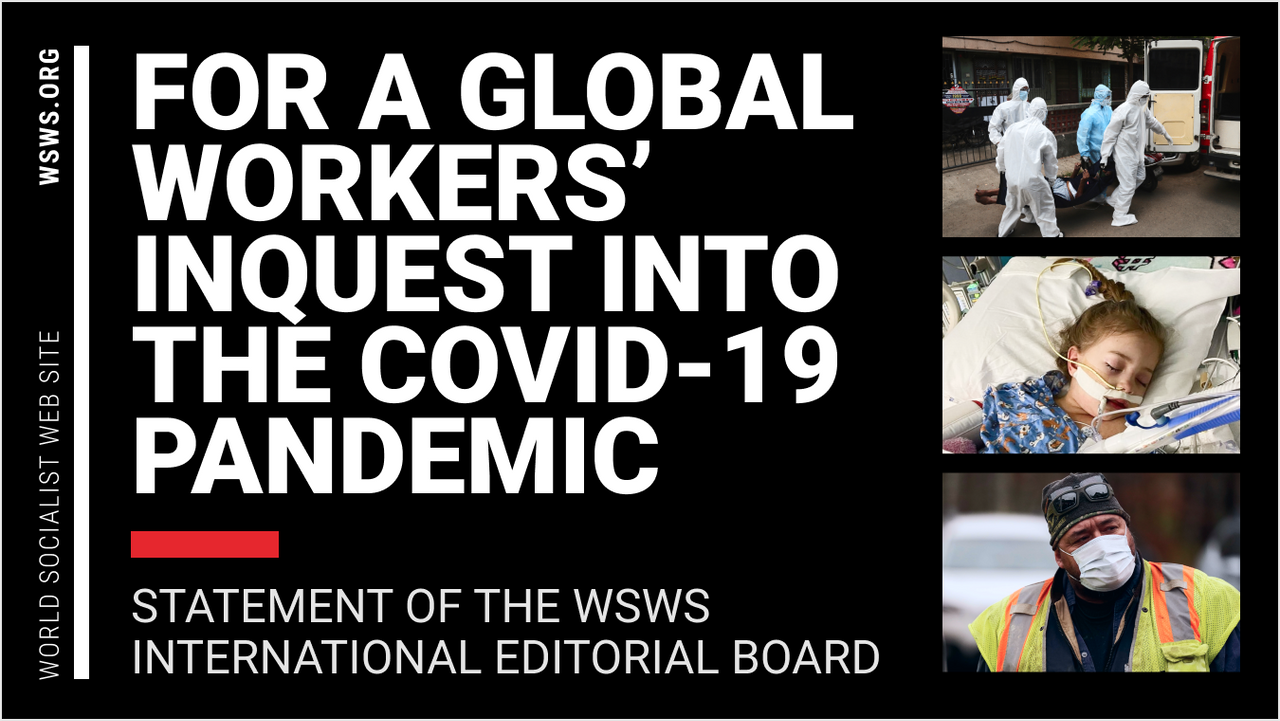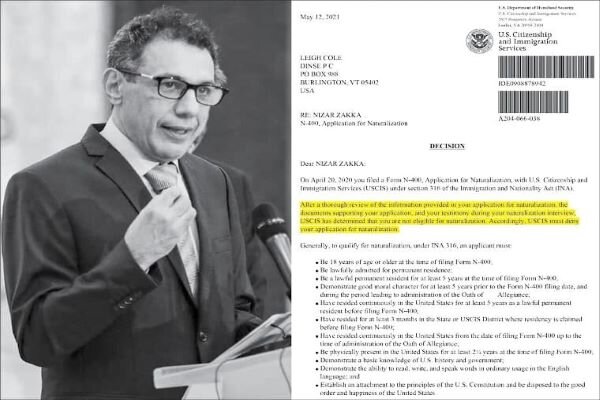(Bloomberg) -- Brazil’s President Jair Bolsonaro said the omicron strain that’s causing a surge in Covid cases at home and abroad could be called a “vaccine virus” and is a “welcome” variant.
“Some studious and serious people -- and not linked to pharmaceutical companies -- say that omicron is welcome and can in fact signal the end of the pandemic,” Bolsonaro said Wednesday in an interview with Gazeta Brasil website.
Bolsonaro has stood out globally for his defiant stance in the face of the pandemic, repeatedly dubbing it “a little flu” despite the more than 600,000 Brazilians who have died from the virus in the past two years. The president, who is up for re-election this year, has been digging in to his position against vaccines. He vowed to not allow his daughter to receive the shot and promised to continue to fight against lockdowns, even as omicron makes landfall in the country, causing cases to surge past 70,000 a day. For most of December, daily infections rarely surpassed the 10,000 mark.
But while hospitalizations have ticked higher in Brazil in recent weeks, so far there hasn’t been an onslaught of patients seeking intensive care units like in mid-2021, before vaccines were widely available. It’s a similar pattern to that seen in countries from Argentina to South Africa and Denmark, and one that has fueled a change to how some nations approach the pandemic.
Despite the seemingly more mild effects of the variant, medical experts warn it could still overburden hospitals and health systems because of how quickly it spreads. Omicron has become the dominant variant in many places, including the U.K., U.S., and Brazil.
Read more: For Some Emerging Economies, New Covid Wave Spawns New Thinking
©2022 Bloomberg L.P.
Brazil flying blind in Omicron surge as
Bolsonaro attacks child vaccinations
Eduardo Parati
20 December 2021
In face of the global spread of the Omicron variant, the government of Brazil’s fascistic President Jair Bolsonaro is fighting any measures that would impinge on corporate profits and openly promoting “herd immunity” through mass infections.
Health agencies worldwide are warning of the real impact of the new variant, with the head of the World Health Organization Tedros Adhanom Ghebreyesus declaring that “we’re concerned that people are dismissing Omicron as mild.” He explained, “Even if Omicron does cause less severe disease, the sheer number of cases could once again overwhelm unprepared health systems.”
Such warnings are already being confirmed by the record number of cases in the UK, where almost 70 percent of the population is vaccinated with two shots.
After the devastating Gamma variant wave in Brazil between April and July, thousands of lives continued to be lost to the pandemic every week, and the number of deaths per week has never fallen below a thousand.

Bolsonaro and his health minister, Marcelo Queiroga, in May 2021
(Wikimedia Commons)
Now, facing the threat of deadly surges with the rapid spread of the Omicron variant, with active cases reported throughout Latin America and community transmission confirmed in São Paulo, Bolsonaro’s Health Ministry has only announced meager travel restrictions for international flights, in which airports would require a vaccine certificate, which are being called “vaccine passports,” or a five-day quarantine for those unable to present one.
Such measures are incapable of preventing the entrance of infected individuals, as breakthrough infections with the Delta variant are well documented and a recent South African study found that vaccination with two Pfizer doses offered only 33 percent efficacy against symptomatic infections from Omicron and only 70 percent protection against hospitalization. Furthermore, many individuals only test positive after 14 days of infection, making a five-day quarantine useless. Finally, the quarantines won’t be regulated by any authority but are to be self-imposed, with no way to account for those entering the country who have no economic conditions or refuse to isolate.
But even such inadequate measures were immediately attacked by Bolsonaro, who has responded to Omicron with a renewed offensive against vaccines and any measures to control the pandemic.
In reaction to demands that the government adopt vaccine certificate requirements, Bolsonaro said, “Is there a better vaccine, scientifically proven, than infection? People who were infected are tens of times more immune than those who only took the vaccine.” That is a lie in itself, as vaccines have been proven to be many times more effective than natural immunity, if a person survives the disease without sequelae. On Thursday, Bolsonaro posted a video on Twitter in which a man claims that the vaccines gave no protection, resulting in vaccinated people being the ones who are infected and transmitting the disease while unvaccinated people were being falsely diagnosed.
Using the fact that Omicron infects and transmits more easily, including among vaccinated people, Bolsonaro called for only RT-PCR tests be to implemented at airports, arguing that “It’s more effective than the vaccine, because the vaccine doesn’t stop the virus from infecting and transmitting.” That is another blatant lie, as the meager testing capacity offered by the government allows the free spread of the disease by individuals who only test once, and before positivity, even if they are already infected.
Last week, during an event in the presidential palace, he also attacked the use of masks, telling the audience that “no one is allowed to wear masks here.”
The fascistic president’s objective is to disrupt any measures that would restrict the spread of the virus, and redouble the efforts for an infection-driven “herd immunity,” regardless of the consequences for the millions of victims. His attack on travel restrictions and vaccines are a critical component of his campaign to defend living with the virus in a “post-pandemic period,” as he described the present to an audience of police officers.
Another aspect of Bolsonaro’s campaign is to carry out yet another blackout on COVID-19 data, allowing him to fraudulently downplay the severity of the pandemic.
In August, the Health Ministry had started demanding specific production batch identification be sent to the government’s database for every COVID-19 antigen test, effectively sabotaging the notification of mild cases for months. The government argues in a fraudulent fashion that positive tests are being falsely reported, and more information would be needed. Actually, it has already been exposed by health experts that pharmacy workers, who carry out most antigen tests, end up overloaded with the new requirements and the result is a gross undercount of positive tests.
Health agency Fiocruz infectious disease specialist Júlio Croda had stated that “This sudden change from the Health Ministry requiring batch and producer provoked many health services to stop reporting antigen exams with negative results, but especially positive ones.” He added that the undercounting will make it impossible to predict future surges. “It’s probable that the country will be taken by surprise with a sudden surge in hospitalizations, when it can be too late to propose planning measures such as the opening of hospital beds,” Croda stated.
More recently, on December 10, a day before the introduction of vaccine passports and quarantines, the government’s online COVID-19 platform was hacked, preventing many states from reporting new cases, deaths and vaccinations while also shutting down the vaccine certificate system.
After the attack, several states stopped reporting COVID-19 data, resulting in a drop. The number of cases dropped almost by half, with 24,164 reported throughout last week in comparison to two weeks ago, when 49,932 cases were reported.
According to Metropoles, the 7-day moving average of deaths fell by 34.9 percent in the week since the hacking. Such an artificial decrease, which has continued for eleven days now, would provide a fraudulent basis to claim that the pandemic is under control.
The attack also affected data from other systems, with Fiocruz stating it is unable to access flu cases from previous months and that they are essential to “keep the population informed on the current epidemiological situation.” The global spread of the Omicron variant is coinciding with a seasonal flu epidemic in the country, threatening to quickly overload the healthcare system.
The hackers were identified as a small non-professional group, who were only capable of hacking the government’s website because there were weaknesses in the platform’s security. Only two days before the invasion, the federal administration had opened a public bid to reinforce security on its servers, pointing out they were incapable of monitoring threats in real time.
Whatever the real motives for the hacking, which happened at a convenient moment for Bolsonaro, the resulting distortion and undercounting of cases and deaths are welcomed by all sections of the ruling class.
Since the first Omicron case was recognized in South Africa, the idea of a “mild” Omicron variant has been promoted in the corporate media. As Brazil flies blind during a deadly global surge, this claim is aimed at keeping factories, workplaces and schools open to guarantee profits for big corporations as the virus rips through the population.
Amid the cancellation of New Year’s events throughout the country, it is also aimed at justifying maintaining preparations for next year’s Carnaval festivities and the unchecked spread of the disease through an anticipated mass influx of tourists.
The corporate media’s complacency towards Bolsonaro’s criminal actions has been shown by its focus on the decision by Supreme Court Justice Luís Roberto Barroso making vaccine passports mandatory for those entering the country, as if it had “defeated” Bolsonaro’s policies. It is not even guaranteed that this grossly insufficient requirement will be enforced. Only five days after Barroso’s decision, Justice Nunes Marques, whom Bolsonaro frequently calls “my 10 percent on the Supreme Court,” was able to stop a final decision on the vaccine passports, postponing it until after the recess in February. This will allow Bolsonaro to continue his campaign against the vaccine passports amid the blackout in COVID-19 data and well into the Omicron phase of the pandemic.

Meanwhile, state governors in Brazil, promoting the insufficient “vaccine-only” strategy, made in-person learning mandatory throughout the country in November, provoking the infection of thousands of children and risking new COVID-19 surges.
Many scientists have explained throughout the pandemic that vaccines are a powerful component in the fight against COVID-19, but they can only truly protect the population if implemented together with other critical public health measures, including mass testing and contact tracing, temporary lockdowns, travel restrictions and high quality masks.
Now, as the Omicron variant exposes the idea that vaccines alone are able to control the coronavirus spread, the “vaccine-only” strategy has allowed fascistic figures such as Bolsonaro not only to attack this critical component in the fight against the virus, but all mitigation measures.
Making clear that the government’s response to Omicron will be to allow a full-blown catastrophe, Bolsonaro reacted angrily to the announcement last week that Pfizer vaccines were approved for children 5 to 11 years old and threatened to effectively put a target on technicians from Anvisa, the national agency responsible for the approval.
Appealing to fascistic elements in his social base, Bolsonaro stated that “We want to publish the names of these people... You have the right to know the names of those who approved vaccines for your children of 5 years old or older.” Such declarations occur amid reports of scientists being persecuted for publishing pandemic data and exposing the government’s policy.
On Sunday, the president made public his plan to distribute jabs for children only under the authorization of their parents and with a medical prescription.
As the new variant is already showing its aggressiveness towards children, Bolsonaro’s policy means letting thousands of children get hospitalized, having to deal with the still unknown long term effects of COVID-19, or even die. Currently, only 66 percent of the population is vaccinated with two doses, and children remain unvaccinated.
The demand for specific medical prescriptions for vaccinating children will leave tens of millions vulnerable, as working-class parents barely have access to doctors in the country’s dilapidated healthcare system.
This is exactly what Bolsonaro intends. Throughout the pandemic, Bolsonaro has presented his campaign against measures to rein in the virus as a fight for “freedom.” Now, his new offensive amid the spread of Omicron promotes the same theme, attacking the vaccine passport as a “leash that they want to put on the people,” while his health minister echoed his words that “It’s better to lose your life than your freedom.”
As international workers enter an offensive in defense of their living standards and very lives, Bolsonaro represents a section of the ruling class prepared to suppress opposition by means of violence and dictatorship.
Workers must not allow another catastrophic surge in cases and deaths. The mass infection campaign of Bolsonaro can be defeated only by a mass movement of the working class in Brazil and internationally. Workers must organize rank-and-file committees to implement the strategy of zero COVID in coordination with health specialists and scientists, implementing temporary lockdowns with full income for workers sheltering, while providing the best safety equipment and rigorous protocols to protect essential workers.

















